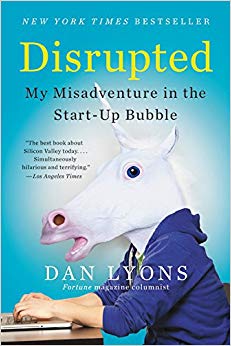Finished on 10/24/18 at 6:00 AM

It's easy to find yourself lost in groupthink. I've seen it happen in groups of all sizes -- from a small group of friends all believing a mediocre restaurant is mind-bending, to insane trends that sweep the nation only to fade a way in a few weeks.
Most of these trends are harmless, but there real risks when companies and economies get stuck in the trough of groupthink. It has the power to create working cultures that de-value the employee, as well as to create and destroy wealth in a way that can massively move the economy.
Lyons book is aimed to pop the groupthink bubble that has been wrapping itself in the latest tech boom -- specifically around 'unicorns', or billion-dollar startups -- and how it's changing the way we work and ultimately may be introducing us to the next large tech bubble.
Very easy to read, and often laugh-out-loud funny, 'Disrupted' takes turns traveling though Lyon's real-life employment at Hubspot (where they say that employees who are fired have 'graduated') and an in-depth study on the economics associated with the 'growth over profit' mindset, which is arguably the most essential part of this book.
Lyons essentially hones in on the fact that most tech companies now are deemed valuable by the rate of their growth, instead of their profitability. Salesforce, Twitter, Facebook, Hubspot -- these companies do not pull in much profit (if any), but are publicly traded and 'valued' at over a billion dollars. Is this OK?
What is true value if it's measured in a trajectory (how many sales are being made) instead of ultimate profitability and service to the economy (how much money is being made on each sale)? Why do we collectively think it's OK to pass this risk onto public shareholders by trading stocks on companies that have yet to prove they will generate profit?
Another interesting point that stuck with me is the cultural move, spurred by the same companies, to view employees as 'a team, not a family', and what that means for the relationship we develop with our employers (and vice versa). What does this mean for when you go through a rough patch (sickness, family issues) or reach the end of your career? Is the new movement incentivizing job hopping and a short-term mindset on generating value? This chapter has stuck with me a bit, and I'm still processing it.
My main criticism of the book is that while going through his own employment, he sometimes comes off as a just a disgruntled employee. Even so, it's worth reading, if only to give you perspective and help you challenge your own views.

